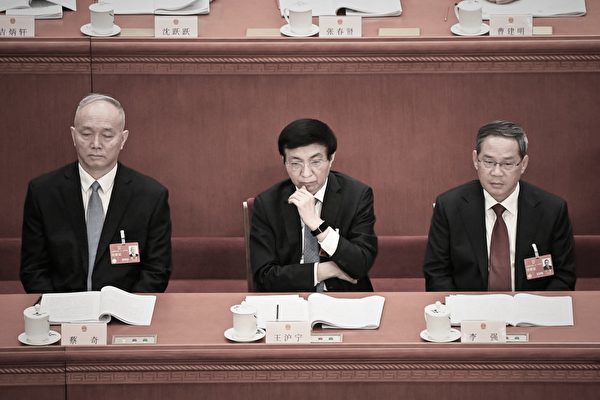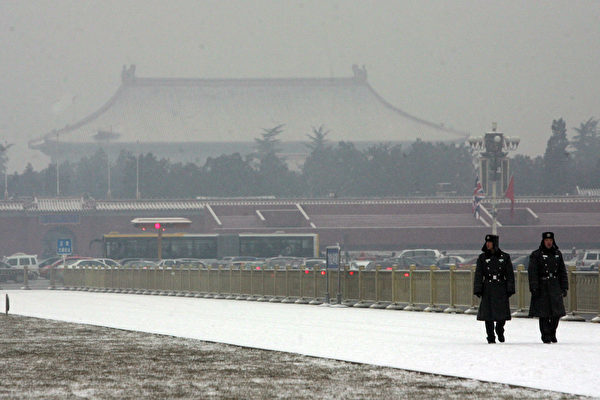Xi Jinping's greatest concern is protecting his family. (People News)
[People News] Since 2024, particularly following the Third Plenary Session, a noteworthy undercurrent has emerged in Chinese politics—a subtle 'unspoken' de-Xi-ification process is taking shape. While this process has not been formally declared and has not resulted in dramatic upheaval, it is becoming increasingly evident in institutional details, the atmosphere of public opinion, bureaucratic discourse, and diplomatic stances. What does this signify? Is it a self-correction within the system, or a precursor to the collapse of the power structure? If we consider 'de-Xi-ification' as a barometer, then Xi Jinping's 'quietly slipping away' of power may indicate the impending arrival of the endgame of an uncontrollable totalitarian regime.
I. Frequent Signs of 'Collective Ambiguity' in High-Level Decision-Making
Xi Jinping's power has not faced open challenges, yet it is undergoing 'structural weakening.' Since 2024, high-level decision-making within the Central Committee of the Communist Party of China has frequently exhibited signs of 'collective ambiguity.' For instance, significant economic policies like 'new quality productivity' continue to be promoted under the label of 'Xi Thought,' but there are no longer direct orders reflecting personal high-level involvement. Additionally, the frequency with which party media focuses on Xi Jinping has notably declined—the previously dominant 'one supreme' style is gradually yielding to the rhetoric of 'collective consultation.'
The underlying cause of this phenomenon is not Xi Jinping's proactive consolidation of power, but rather a defensive restructuring within the system itself. Since the total failure of the 'zero-COVID policy', the political legitimacy of the leadership has faced significant challenges. Xi Jinping, once seen as the 'pillar in the storm' during times of risk, has now become a potential focal point of accountability. In a political system that instinctively prioritizes self-preservation, the bureaucratic elite is instinctively pursuing 'de-risking'—essentially, 'de-Xi-ing'.
2. The system is left with only one option: to subtly marginalise the 'core'.
'Ve-Xi-ing' is not just about diluting personal influence; it signifies a deeper loosening of the power core. Over the past decade, Xi Jinping has redefined the structure of 'loyalty' through his anti-corruption campaign, but this fear-based system has failed to establish a robust institutional identity. The paradox of totalitarianism is that while power is highly concentrated and appears stable, any fissure can lead to systemic imbalance.
Recent indications suggest that the process of 'decentralisation' has commenced in key sectors:
1. Economic system: The economic bureaucratic group of the Chinese Communist Party is moving away from Xi's style of thinking, returning to pragmatism, and reintroducing discussions around 'market' and 'reform';
2. Diplomatic system: The diplomatic apparatus of the Chinese Communist Party is also moving away from the 'wolf warrior' mentality and is working to rebuild practical communication with the West.
3. Propaganda system: The Central Propaganda Department is quietly reducing its emphasis on personal worship, shifting its focus more towards a framework of 'security narrative' and 'collective responsibility'.
This situation is not about winning or losing in a power struggle; it is an adjustment of the self-preservation logic within the system. Faced with the contradictions of 'unable to fully settle accounts' and 'unable to continue blind obedience,' the system has only one option left: to subtly marginalize the 'core.'
3. The Ultimate Paradox of Totalitarianism Out of Control: No One Can Take Over, and No One Dares to Step Down
The fundamental dilemma of a totalitarian regime is that everyone is waiting for 'someone else to take action,' and once someone does, the entire system could collapse in an instant. This 'caged beast equilibrium' means that the process of de-Xi (去习化) can only proceed in a 'non-linear manner': there are no dramatic breaks, but rather a gradual draining of power.
Currently, the political landscape in China has entered a phase characterised by 'totalitarian structure out of control':
1. The gap between information control and reality is widening: public opinion regarding economic decline, youth unemployment, and social discontent is almost collectively muted, leading to an increasingly distorted government system.
2. The decision-making process is marked by 'false consultation': all major decisions are announced under the guise of 'the Party Central Committee's decision,' but in reality, they represent the least common denominator after various parties have weighed and compromised.
3. The responsibility mechanism is being offloaded at multiple levels: local governments, the financial system, and policy departments facing issues generally choose to 'shift responsibility' and push it outside the system—yet the 'Xi core' cannot completely escape its symbolic burdens.
As a result, Xi Jinping cannot be entirely marginalised nor can he continue to control the overall situation—he has become an 'invisible negative asset' that the totalitarian system cannot sustain. This condition is both unstable and offers no exit.
4. Outlook on the Endgame: Signs of system disintegration are lurking in the undercurrents of 'de-Xi.'
Historical experience indicates that the demise of totalitarian regimes is often not characterized by a dramatic revolution on a specific day, but rather by a sudden collapse after a prolonged period of the system being 'out of control.' When every unit within the system is 'waiting for others to take the lead in dismantling order,' the actual breakdown frequently occurs at a moment that appears 'calm.'
In the case of China, future changes may not present themselves as 'palace coups' or 'mass uprisings,' but instead as a gradual unloading of 'negative power' within the system, ultimately resulting in a loss of collective action capability. At that point, even without a public opponent, the system may disintegrate simply because 'no one wants to maintain it' any longer.
These signs may be hidden within the 'de-Xi' currents we observe today.
Conclusion: The end of totalitarianism will no longer require adversaries.
The symbolic significance of the Xi Jinping (Xi Jinping) era is transitioning from 'high concentration' to 'systemic silence.' This shift is not a failure of his personal will, but rather an inevitable outcome of the self-dissipation of totalitarian structures under modern conditions. When a political entity lacks 'authority to rely on, responsibility to uphold, or a credible vision,' it will no longer need enemies—it can bring about its own end.
'Veering away from Xi' does not signify the advent of democracy, but it may serve as a precursor to the collapse of the totalitarian regime.











News magazine bootstrap themes!
I like this themes, fast loading and look profesional
Thank you Carlos!
You're welcome!
Please support me with give positive rating!
Yes Sure!